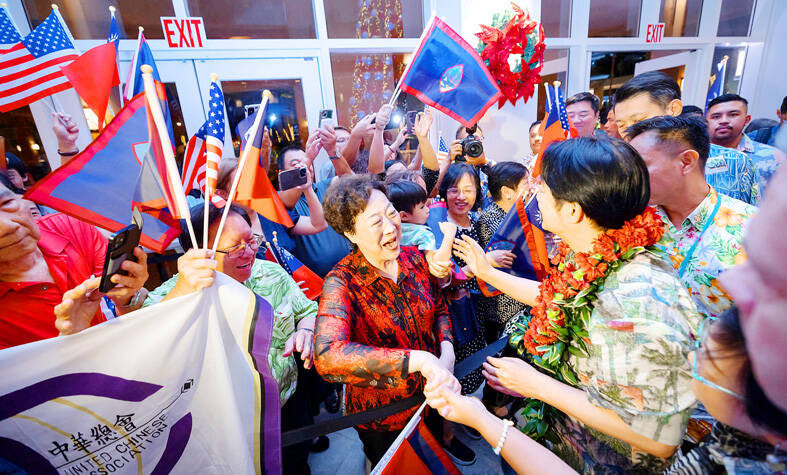President William Lai’s (賴清德) visit last week to Taiwan’s three Pacific allies, accompanied by stopovers in the US, focused on strengthening democratic alliances in the region, the Presidential Office said yesterday.
The week-long tour from Nov. 30 to Friday last week, organized under the theme “Prosperous Austronesia, Smart Sustainability,” included visits to the Marshall Islands, Tuvalu and Palau, as well as stopovers in Guam and Hawaii.
Lai’s trip was an example of Taiwan “using democratic alliances to engage with the world,” Presidential Office spokeswoman Karen Kuo (郭雅慧) said in a statement yesterday.

Photo courtesy of Taiwan Presidential Office via AFP
The trip’s itinerary linked Taiwan, in the first island chain, to its three diplomatic allies and Guam in the second island chain, and Hawaii in the third island chain, she said.
Kuo was referring to terms used to describe the “island chain strategy,” a marine containment strategy developed by the US during the Cold War that has more recently been applied to containing China.
Lai’s itinerary and his remarks during the trip focused on three main elements, the first being Taiwan’s “international visibility and importance as a country in the first island chain,” the spokeswoman said.
In a telephone call during Lai’s stopover in Guam, US House of Representatives Speaker Mike Johnson said Taiwan is at the core of the US’ Indo-Pacific strategy, Kuo said.
Lai pledged throughout the trip that Taiwan would put its full efforts into strengthening its defensive capabilities, she said.
Second, the trip showed how Taiwan is seeking to build democratic alliances, including with its South Pacific allies, the US, Japan and Australia, to jointly maintain regional peace, stability and prosperity, Kuo said.
Third, amid efforts by China and Russia to break through these “democratic island chains,” Lai’s trip also showed that the Indo-Pacific has become a “global security community,” and that “the Taiwan Strait issue is a joint challenge for global democracies,” Kuo said.

The disruption of 941 flights in and out of Taiwan due to China’s large-scale military exercises was no accident, but rather the result of a “quasi-blockade” used to simulate creating the air and sea routes needed for an amphibious landing, a military expert said. The disruptions occurred on Tuesday and lasted about 10 hours as China conducted live-fire drills in the Taiwan Strait. The Civil Aviation Administration (CAA) said the exercises affected 857 international flights and 84 domestic flights, affecting more than 100,000 travelers. Su Tzu-yun (蘇紫雲), a research fellow at the government-sponsored Institute for National Defense and Security Research, said the air

Taiwan is to commence mass production of the Tien Kung (天弓, “Sky Bow”) III, IV and V missiles by the second quarter of this year if the legislature approves the government’s NT$1.25 trillion (US$39.78 billion) special defense budget, an official said yesterday. Commenting on condition of anonymity, a defense official with knowledge of the matter said that the advanced systems are expected to provide crucial capabilities against ballistic and cruise missiles for the proposed “T-Dome,” an advanced, multi-layered air defense network. The Tien Kung III is an air defense missile with a maximum interception altitude of 35km. The Tien Kung IV and V

Trips for more than 100,000 international and domestic air travelers could be disrupted as China launches a military exercise around Taiwan today, Taiwan’s Civil Aviation Administration (CAA) said yesterday. The exercise could affect nearly 900 flights scheduled to enter the Taipei Flight Information Region (FIR) during the exercise window, it added. A notice issued by the Chinese Civil Aviation Administration showed there would be seven temporary zones around the Taiwan Strait which would be used for live-fire exercises, lasting from 8am to 6pm today. All aircraft are prohibited from entering during exercise, it says. Taipei FIR has 14 international air routes and

Taiwan lacks effective and cost-efficient armaments to intercept rockets, making the planned “T-Dome” interception system necessary, two experts said on Tuesday. The concerns were raised after China’s military fired two waves of rockets during live-fire drills around Taiwan on Tuesday, part of two-day exercises code-named “Justice Mission 2025.” The first wave involved 17 rockets launched at 9am from Pingtan in China’s Fujian Province, according to Lieutenant General Hsieh Jih-sheng (謝日升) of the Office of the Deputy Chief of the General Staff for Intelligence at the Ministry of National Defense. Those rockets landed 70 nautical miles (129.6km) northeast of Keelung without flying over Taiwan,